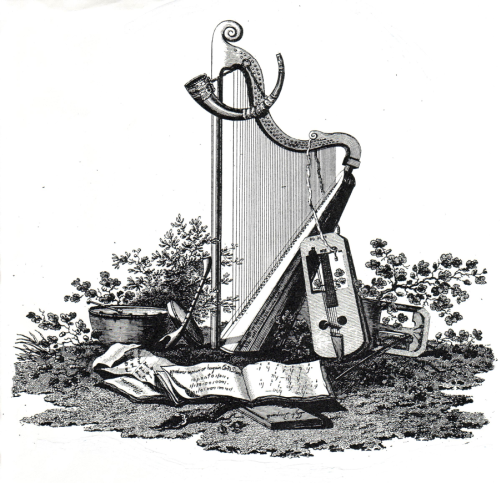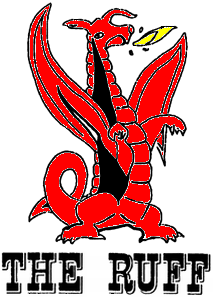|
|
Gwerincymru — o Gymru o’r byd |
||
|
or The end of an Era...
On the recent occasion of my sixtieth birthday I received, as well as my treasured bus-pass, a generous gift from the other members of my clog-step group. It was an envelope containing a half-dozen free passes to a series of events that I’ve attended regularly for over thirty-five years, those being the RUFF ceilidhs held at Cardiff’s Heath Hospital Sports and Social Club. The full significance of these vouchers didn’t strike me until some weeks later, when it became apparent that I’d never again pay to attend one of these wonderful social occasions, the sad reason being that the final ceilidh will happen in less than twelve months’ time. Yes, as I write, only four more RUFF ceilidhs are scheduled, the final one to be held on Saturday, December 14, 2013.
The dances at the Heath Hospital have been happening since the mid 1970s, and have actually been one of Britain’s longest running series of ceilidhs regularly attended by the general public, but Dave and Helen Parsons, the last active members of the team that originally instigated the events, are now admitting to feeling their age. They would love to hand over the dances to others, but everything must be right. They would be looking for volunteers with the same feelings towards the dances, bands, callers and music that want to keep alive traditions and help develop the new, exciting trends which are proving that folk dancing is alive and kicking in the 21st century. I joined Dave and Helen at a Cardiff hostelry to chat about old times over a pint of good old Brains Bitter.
Everything kicked off late in 1974. South Wales Mountaineering Club members Dave Parsons and Tom Fletcher were both active within Cardiff Morrismen while Dave’s wife Helen, another keen SWMC member, danced with Cardiff Ladies Morris, becoming one of the founding officers of what was then the Women’s Morris Federation – now just the Morris Federation. Travelling to Morris weekend events up and down the country, they’d all been exposed to the concept of the Saturday night ceilidh, and they drew in another SWMC member, Mike Harber, to look into the idea of setting up something similar on their home patch in Cardiff. Mike was well-known locally as a fine folk singer, and acted as genial host of Cardiff’s New Tradition folk club, where he was also responsible for booking acts. And so it became Mike’s job to engage top artistes on the national folk scene to perform song spots at the ceilidhs, while Helen and Dave would sort out the bands and callers.
Then it was a question of locating a venue for the new venture. Says Helen, “We were playing badminton in the hospital sports hall and decided that might be a good option. We asked about its availability and we were told it was in use each evening during the week but was free on Saturdays.” So that was that! And Dave recounts the origin of the name. “The Sports Council of Wales used to promote a Festival of Movement Dance at the Sophia Gardens sports hall, and both Cardiff Morrismen and Cardiff Ladies Morris were always booked to perform. When SCW looked for another item for their programme, the combined Morris sides decided they’d demonstrate three folk dances. We hadn’t practised anything, and told them it was “just rough country dancing”, but somehow in the programme we became the Ruff Country Dancers. When we started the ceilidhs, we used that name.” Dave added “It’s an urban myth that it stands for Roll up for Folk as we were told by one customer! Our very first ceilidh was with a local band, Llandaff Hope, with caller Dick Shilton (yet another Cardiff Morrisman!), and the police insisted on sending along an officer to keep an eye on us, in case we caused trouble. And we had to pay for the privilege - more than we paid for the band! But after that we were okay.”
Whilst the RUFF ceilidhs gathered momentum, Helen, Dave and Mike all continued with their regular mountaineering ventures, but tragedy struck in 1985 when Mike became separated from a climbing party which included Dave and Helen in the highest Himalayas and he was eventually left, presumed dead, when mountain rescue searches failed to find him. A memorial service was held for Mike in Cardiff and, with both the folk and climbing communities in a state of prolonged shock, the RUFF ceilidhs briefly stopped, restarting only when everyone involved had regained their composure.
There was another temporary foreclosure a few years later after a new police inspector called in one night. “’Now, I’m not going to arrest anyone; I’m not going to charge anyone. But are you aware that you’re selling alcohol to the general public on unlicensed premises?’” Helen quoted the officer. She went on: “We’d always been given to believe by the steward and committee of the staff social club that the hall was covered under the club’s licensing arrangement, but it turned out we’d all been wrong!” A lot of hurried legal manoeuvring, and at least one dance diverted to a nearby primary school hall where Dave had been teaching, had to take place before the ceilidhs were allowed to resume at the hospital.
Speaking of licensing matters, during the early years, dancers would refresh themselves with ample quantities of beer, and it was usual for as many as five kilderkins (18 gallon casks) from a variety of well-respected brewers to be on stlllage behind the temporary bar. Quite a few dancers were members of the Cardiff branch of CAMRA, of which Tom Fletcher was then Branch Chairman, while Cardiff’s pubs were then all owned by half a dozen breweries, most of whom could offer no real ale at all. Inevitably word got out about a monthly beer exhibition at the Heath hospital, and local ale aficionados would happily pay the ceilidh door price to taste their way through the ever-changing range of beers on offer. “The local police would always call in at the end of the night to check on us – and the beer!” However, just sometimes, the beer wasn’t all sold on a Saturday night. So what would happen then? “Well” says Helen, “several Sundays were spent with friends from SWMC and the Morris teams just having a few drinks to finish up the beer left over from the previous night’s ceilidh. In fact, Dave’s Mum spent one Mothers Day in the hall while Cardiff Morrismen played drinking games around her to empty the last barrel!” And it happens that the longevity of the RUFF dynasty at the hospital Sports and Social Club has seen it outlast three club managers and five stewards. “It’s great!” exclaims Dave. “We’ve been here so long that when a new manager comes in, we tell them how things have been, and how we see things continuing, and basically, we tell them the rules!”
Over the years, the Parsons household has played host to every big name band on the British dance circuit as musicians and callers would request overnight accommodation before moving on the next day. Second home for Cardiff Morrismen in the late seventies and early eighties was a splendid old pub situated in idyllic isolation in a wild outpost of Cardiff that is now a part of Cardiff Bay. That pub was The Penarth Railway Hotel, also known as the Red House. Says Helen, “The High Level Ranters were booked for one ceilidh. They stayed over with us and we all met up again on the Sunday lunchtime at the now sadly missed Red House where they took over and provided an impromptu, free two hour show before heading off to Sheffield for an evening concert.” Those were great times indeed. I was there myself at the Red House that Sunday and I can recall local musicians turning up in the tiny bar with fiddles, squeezeboxes and even a double-bass to join in with the celebrated guests.
The RUFF was also instrumental in the formation of one of Wales’s most enduring folk acts. I well remember the occasion when the group Swansea Jack was working the interval song spot, and at the end of the night, my friend from Cardiff Ladies Morris who had also been dancing there told me she’d been chatting to their concertina player. “He’s all right, he is!” she exclaimed. Pat Smith was that friend and the concertina player was Mick Tems. And thus my friends, Calennig was born!
These days, Dave Parsons is known up and down the country as a top-rate caller for ceilidhs, as well as for the more structured “dancers’ dances”. But all of this stems from humble beginnings. “John and Sue Kirkpatrick turned up to play a RUFF ceilidh with their band Umps and Dumps, and promptly asked ‘Who’s calling?’” explains Dave. “Well, as far as I knew, we’d booked them with their own caller.” Wrong again, Dave! And so, confessing to having called a few dances very informally at Morris get-togethers, he was thrust into the limelight and called his very first ceilidh, with one of Britain’s top bands of the day!
The ceilidhs have always been non-profit making and any profit at the end of a year has been given to hospital charities, although there had been times when the RUFF’s fortunes were flourishing, buoyed by healthy bar takings in those five-kilderkins-a-night times, while Mike’s folk club was struggling, and so the one institution was able to support the other. Dave says: “Over the years, we have introduced literally thousands of people to folk dancing, to dances from across Britain and America. We have never had any funding from Arts Council Wales, even though we did apply when times were really hard a few years ago. The ceilidhs have always had to be self funding, and for the past few years have just broken even.”
After the RUFF ceilidhs had become an established feature of the South Wales folk scene, there came an inclination amongst the organisers and regular ceilidh-goers to have a go at some more intricate dances, leading to the formation of the RUFF Folk Dance Club, which was formed in May 1989 and meets every Monday in St Andrews Church Hall, Birchgrove, in northern Cardiff. “We try to do some more challenging dances and develop club callers, but the most important thing is that people enjoy themselves”, says Helen. “The ethos of the Ruff is to promote the enjoyment of dancing and to bring the best British bands and callers to Cardiff. We’d love some people with the right credentials to step up and take things over. We’ve given plenty of notice in the hope that someone will come forward.”
The final run-down of RUFF ceilidhs in 2013 is as follows: February 16: Peeping Tom with caller Nick Walden; March 23: Token Women; October 26: Junction 24 with caller Mic Spenceley; December 14: The grand finale with Juice and caller Dave Parsons.
|
|||


